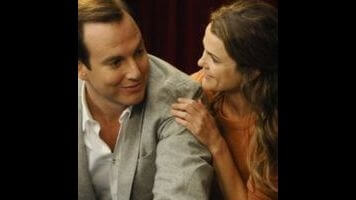Somewhere down the line, Running Wilde got away from itself.
(With that, brace yourselves for another Arrested Development comparison. I know some of you don't like it—see these as two separate shows—but I can't help calling it to mind when watching Mitch Hurwitz's work. Plus, if the music playing when Steve hugs his dad is any indication, they've given up on trying to hide the similarities.)
Arrested Development had a humongous cast of characters, but the set-up was deceptively simple. Michael was the center of everything, and his agenda involved everyone else. He was trying to keep the Bluth family afloat, and it would take everyone's help, even if they didn't realize it. Still, at the end of the day, every character except for Michael had a purely selfish agenda. On the grand scale, sure, everything came together, but on an episode-by-episode basis, Gob was responsible for Gob, Buster for Buster, Lucille for Lucille (and despite her best efforts, a little bit of Buster, too). There was an elegant simplicity in this crowded show, and thus nothing ever felt claustrophobic. The excellent narration certainly didn't hurt.
Running Wilde has a large cast as well, though not at Arrested Development levels obviously. Yet it's unwieldy, because almost everyone is operating in service of Steve Wilde, without much else going on in the background to justify their existence. Emmy, Puddle, Migo, and Lunt work in service of Steve and whatever kooky scheme he's got cooked up for the week, and that's about it. In "Basket Cases," the final Running Wilde episode serving as the series finale, Migo merely offers Steve a little bit of advice, then disappears with Fa'ad on a picnic. Lunt—or Philip Seymour Hoffman who'd let himself go—does just about as much, for just about the same reasons. The stories aren't that complicated, but involve far too many key players who, in the absence of anything else to do, make Running Wilde much more of a slog than it should be.
Which is a bummer, because "Basket Cases", purely plot-wise, was one of the stronger episodes of the show. We get to see Jeffrey Tambor as Steve's father, chairman and CEO of Wilde Oil, trying to do damage control after oil begins to leak into the ocean. From Wilde Sr.'s perspective, there really isn't much anyone can do to actually clean up the disaster, so he simply makes a series of commercials that paint Wilde Oil in a much more positive light. And he enlists Emmy's help, knowing she's a do-gooder who can put an attractive face on these fake efforts. Problem is, Emmy doesn't know they're fake; she thinks she's truly making a difference. Steve, for the first time, meddles in his father's affairs and rushes to the beach (made to look like the actual affected area with chocolate syrup and a few prostitutes sunning themselves) to let Emmy know the truth. Steve Sr. is upset, Steve Jr. doesn't care, and whisks Emmy away in Puddle's newly acquired mini-Escalade.
The episode provides a nice base from which to ramp up Running Wilde's established (although sometimes flimsy) dynamics. We've heard so much about Steve's father and how much of a monster he was to Steve, and when he arrives it's tough to hate the guy. He's in tears, begging for his son to help him out. The reveal that it was all part of Steve Sr.'s plan—and that yet again it was a plan Steve Jr. wasn't privy to—is a smooth one, and comes with help from Andy, a character who unlike the others has his own story happening in the background. I still don't quite understand what Steve and Emmy see in each other besides "They liked each other when they were young and share a few memories", but if this entire show has been building to a moment where Steve whisks her off her feet, it happened, and Running Wilde can end satisfied.
Looking back on the show's ill-fated run (being shuffled around time slots and networks can give that impression), it seems like Running Wilde had a blueprint, abandoned it, and did what it had to do to save face in the 11th hour. This was going to be an escalated, cartoonish world built around Steve Wilde; let's not forget that in the pilot, he and Fa'ad had a one-upsmanship thing happening around who owned the tiniest horse. There were a lot of characters surrounding Steve and Emmy, but both had big personalities that worked in opposition. Steve was so far up his own ass he'd lost sight of everything, and Emmy was so far up other people's asses she'd forgotten how to do something for herself every once in a while. Over time, the two started to get along, and even share similar views, spun to be more important than they probably were for the sake of week-to-week conflict.
The show was first grounded in tension and conflict, then quickly switched, becoming grounded in Steve and Emmy's mutual understanding of one another's faults. It's quite a shift for a show to take, and the rest of the characters similarly pulled towards the center, dropping their eccentricities and individual idiosyncrasies to service the occasionally muddled story. There were a lot of people contributing to each important plot point, and eventually they ran out of things to say. Yesterday's yoga-cramming subplot is a one-time-only thing, whereas Tobias spent an entire season of Arrested Development trying to get into the Blue Man Group. For Running Wilde, it was time to set its sights bigger or much narrower, and instead we got a crap-load of people providing the exact same take on each basic story.
Running Wilde, for all it did right and wrong, will be remembered for existing in the middle.


 Keep scrolling for more great stories from The A.V. Club.
Keep scrolling for more great stories from The A.V. Club.